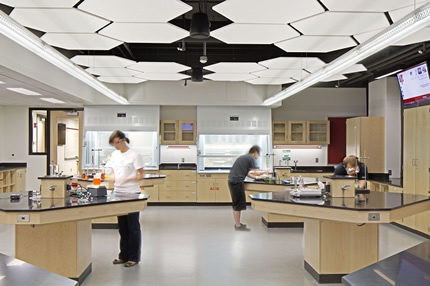Renovations Create 'Most Advanced Instructional Facility' at Nebraska-Lincoln
One
of
the oldest buildings on the campus of the University
of Nebraska-Lincoln (UNL)
has been turned into what one administrator is calling "UNL's most
advanced
instructional facility."
An
$8-million
renovation has turned the 107-year-old Brace Laboratory, for decades
the home of the university's physics department, into a facility
equipped for
the latest innovative teaching methods for undergraduate education.
The
building
now has:
- Four
life science
laboratories;
- A
186-seat
auditorium;
- Four
classrooms
designed for collaborative instruction;
- A
"technology
transforming teaching" classroom to be used to help instructors evaluate
teaching technologies; and
- Office
space for information technology employees.
The
classrooms
have been designed to seat 36 students in furniture arrangements
allowing groups of six to work together, along with multiple white
boards
around the rooms.
| |

Life science labs in the renovated Brace Laboratory are designed to allow maximum student collaboration. |
|
UNL
administrators
said the classroom design reflects the fact that collaborative
learning concepts are replacing the traditional lecture hall approach to
undergraduate education.
"We
designed
it to support modern research-based pedagogies," said UNL Associate
Vice Chancellor Lance C. Perez, in a prepared statement. "Learning spaces have been built
purposefully
and intentionally to support active learning."
The
renovated
space, which opened with the beginning of the university's fall
semester August 25, will primarily be used for biology and life sciences,
mathematics and business administration classes. The collaborative
classrooms
will mostly be used for 100-level math courses.
"Mathematics
has
invested in professional development and updating how they teach many of
their 100-level courses," Perez said. "The focus will be on small groups
working
together."
Three
of
the life science laboratories will be "wet" labs while the fourth "dry"
lab
will be designed specifically for virtual instruction.
The
large
auditorium will mainly be used by the College of Business
Administration,
which still has a number of large lecture courses.
Perez
said
that "what is significant about this space is that the entire building
is
dedicated to supporting undergraduate teaching and learning. This
project has
made Brace, in many ways, UNL's most advanced instructional facility."
Other
renovations
of the building, constructed in 1906, include the addition of
restrooms (there were only two when the three-story building was
built.); the
replacement of radiators and window-unit air conditioners with modern
heating
and cooling systems; asbestos abatement; and the repair and replacement
of
floors, ceilings and walls.
About the Author
Michael Hart is a Los Angeles-based freelance writer and the former executive editor of THE Journal.